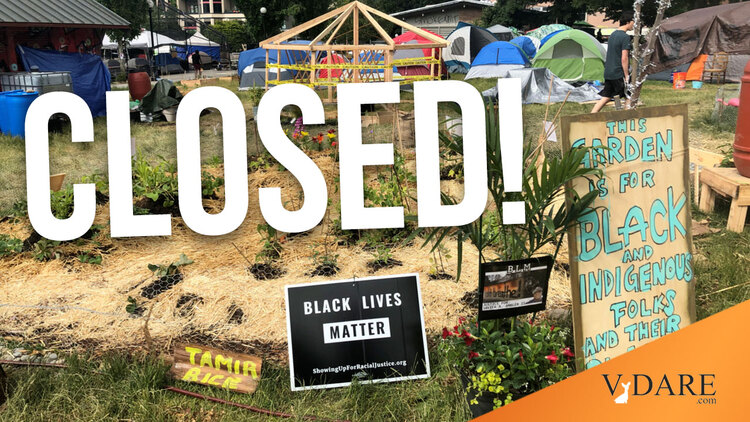
Black Lives Matter Garden In Seattle Closed By City Because Of Violence, Drug Use, Vandalism, And Increase In Rodent Population
By Paul Kersey
12/29/2023
Three years after the creation of a community garden planted in the name of Black Lives Matter in Seattle, the city has removed the park after it became a hotbed of crime and a public health hazard.
Seattle closes Black Lives Matter garden amid rampant homelessness, drug use and vandalism, by Greg Wehner, NY Post, December 28, 2023
Seattle closes Black Lives Matter garden amid rampant homelessness, drug use and vandalism https://t.co/CMGeIWAzRe pic.twitter.com/N4tIth74MT
— New York Post (@nypost) December 28, 2023
Members of Seattle, Washington’s Parks and Recreation department, along with city police, removed a community garden planted in Cal Anderson Park as part of the Black Lives Matter protests in 2020 on Wednesday.
City officials said in a statement that the “makeshift,” temporary garden was being removed because of public health and safety concerns, as well as for maintenance reasons including reseeding and turf restoration.
The efforts on Wednesday also included the removal of tent encampments located near the garden and outside the park along E. Olive Street, which city officials said was to ensure the public spaces remain clean and open for everyone.
So far this year, the City’s Unified Care Team has cleaned up encampments at Cal Anderson Park 76 times, making the park one of the most frequently addressed areas in the city for repopulated encampments, the city said.
City officials also said the temporary garden has created unsafe conditions for people who enjoy the park.
Examples of incidents include vandalism in the park’s public bathrooms, public drug use, unauthorized camping and an increasing rodent population.
The Seattle Times reported that Seattle Parks planned to act in October, though the city received push back from the Black Star Farmers, a group that stewarded the garden.
In fact, the group petitioned over 5,000 signatures from people against the park’s removal, citing the garden honors Black and Indigenous people killed by police.
The opposition also claimed the park provides community members a place for joy and healing, as plants like amaranth, tobacco, corn, currants, strawberries and more grow there.
Still, Seattle Parks said the park needed to be removed so the park could be used for other reasons.
Located in the park’s “Sun Bowl” area, the park offers a space for gatherings and events and is near electrical and water hookups.
The publication reported that supporters of the garden watched the park get taken out by construction vehicles guarded by park rangers and police.
One bystander said no notice was given of the removal, yet he showed up to save some of the plants.
Seattle Parks said it has conducted community engagement with park visitors, neighbors and adjacent businesses near the garden since 2020 and received “significant” feedback showing a desire to relocate the garden elsewhere in the park.
The department also said it has been in communication with community activists since 2020, offering alternative locations for the garden, though none of the locations were acceptable by the organizers of the garden.
The city said it “remains committed to an ongoing dialogue to produce an alternative garden site.”
Several community leaders weighed in on the garden’s removal, including council member-elect Joy Hollingsworth, who said parks should be maintained to be safe, clean and welcoming.
Seattle recently broke a 44-year record for homicide, almost entirely courtesy of a black population representing seven percent of the city.
This park, created in honor of Black Lives Matter, brought about an “increased rodent population.”
In reality, it should never have been removed or torn down, but left up as the fitting reminder of what Black Lives Matter create in the vacuum of leadership when white people capitulate in the face of being called “racist.”
Truly, it was a fitting reminder to the world George Floyd helped create.
